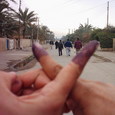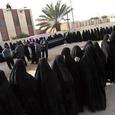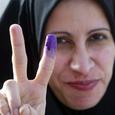Just found this from the website of Daniel Pipes:
Caught My Eye An occasional series of noteworthy quotes, in reverse chronological order.
__
Victor Davis Hanson: "Imagine a world in which there was no United States during the last 15 years. Iraq, Iran, and Libya would now have nukes. Afghanistan would remain a seventh-century Islamic terrorist haven sending out the minions of Zarqawi and Bin Laden worldwide. The lieutenants of Noriega, Milosevic, Mullah Omar, Saddam, and Moammar Khaddafi would no doubt be adjudicating human rights at the United Nations. The Ortega Brothers and Fidel Castro, not democracy, would be the exemplars of Latin America. Bosnia and Kosovo would be national graveyards like Pol Pot's Cambodia. Add in Kurdistan as well - the periodic laboratory for Saddam's latest varieties of gas. Saddam himself, of course, would have statues throughout the Gulf attesting to his control of half the world's oil reservoirs." ("The Disenchanted American," National Review Online, January 9, 2005)
Josef Joffe: "Imagine that Israel never existed. Would the economic malaise and political repression that drive angry young men to become suicide bombers vanish? Would the Palestinians have an independent state? Would the United States, freed of its burdensome ally, suddenly find itself beloved throughout the Muslim world? Wishful thinking. Far from creating tensions, Israel actually contains more antagonisms than it causes." ("A World Without Israel," Foreign Policy, January/February 2005)
Natan Sharansky, ex-Soviet dissident and Israeli politician, describing his November 2004 meeting with George W. Bush: "I told the President, ‘You don't look like a politician. You look like a real dissident, because politicians always look at what polls say, but you believe in democracy and freedom… Even when your colleagues in Europe tell you that democracy is impossible, you go ahead with it. You are a real dissident'." ("Peace Will Only Come after Freedom and Democracy," Middle East Quarterly, Winter 2005)
George Jonas, columnist: "Attempts to spread Western values around the world haven't been entirely unsuccessful [but] … in the realm of values, the balance of trade hasn't favoured the West. … We haven't exported tolerance nearly as often as we've imported intolerance. We haven't strengthened individual liberties in other regions nearly as much as we've reduced them at home. Today, we're less free to speak, associate, do business, choose pastimes or lifestyles than we were 50 ago (except in matters having to do with promiscuity or sexual preference)." ("Exporting freedom, importing intolerance," National Post, Dec. 27, 2004)
David Kershner, Los Angeles, in a letter to the editor: "Since when did it become the civil-rights lobby's mandate to preclude me and my loved ones from having every precaution taken to ensure our safety? … My suggestion is that the civil libertarians license their own airline, where no security check is required, no identification needed, and the pilot and airline are absolved from legal responsibility for any catastrophe resulting from a terrorist incident (understanding that the plane will be shot down if it deviates unannounced from its pre-determined flight path). The rest of us will provide fingerprints, driver's licenses and any other proof to lessen the risk of being blown to bits." ("Civil Liberties Zealots Need Their Own Airline," The Wall Street Journal, Dec. 13, 2004)
Muhammad Shahrour, a Syrian writer on Islam: "When you take the political Islam, you see only killing, assassination, poisoning, intrigue, conspiracy and civil war, but Islam as a message is very human, sensible and just." (Neil MacFarquhar, "Muslim Scholars Increasingly Debate Unholy War," The New York Times, Dec. 10, 2004)
Maria Margaronis: From London, "the most frightening thing about Bush's victory is the prospect of a world divided between warring fundamentalisms, with Europe in the middle struggling to hold on to its Enlightenment legacy." ("Fears of a World Divided," The Nation, Nov. 22, 2004)
Stephen H. Balch, president of the National Association of Scholars: "Our colleges have become less marketplaces of ideas than churches in which you have to be a true believer to get a seat in the pews. We've drifted to a secular version of 19th-century denominational colleges, in which the university's mission is to crusade against sin and make the country a morally better place." (Quoted in John Tierney, "Republicans Outnumbered In Academia, Studies Find," The New York Times, Nov, 18, 2004)
Jonathan S. Tobin: With the death of Yasir Arafat, "the policy wonks at the State Department, the Council on Foreign Relations and the ‘Middle East experts' at major American newspapers (The New York Times' Thomas L. Friedman, The Philadelphia Inquirer's Trudy Rubin, etc.) are commemorating Arafat's passing in the way they have reacted to virtually every piece of news that comes out of the region: calling for more U.S. pressure on Israel to revive the peace process." ("Conventional Wisdom Rides Again: Arafat is buried, but the usual foolish policies rise from the dead," Jewish Exponent, Nov. 18, 2004)
Max Boot: Colin Powell "traveled less than any secretary of State in 30 years. It was not entirely a coincidence that the U.S. image in the world sank to new lows while Powell busied himself at Foggy Bottom. Telephone calls and meetings with foreign ministers in New York and Washington are fine, but they're not enough to win the battle for hearts and minds. We need a secretary of State who travels incessantly to explain and defend American policies. In the age of satellite television, no nation can afford to have striped-pants diplomats whose activities are limited to cocktail parties. The model should be Oprah Winfrey, not Dean Acheson." ("Dearth of a Salesman," Los Angeles Times, Nov. 18, 2004)
Simon Henderson: "A new seven-star hotel is nearing completion in Abu Dhabi, only the second such rated hotel in the world; the other is in Dubai." ("The UAE after Sheikh Zayed: Tensions between Tribe and State," PolicyWatch, Nov. 12, 2004)
Gal Luft, executive director of the Institute for the Analysis of Global Security: "the U.S. finds itself in the position of financially supporting both itself and its enemies in the ‘War on Terror.' … Every time an American goes to a gas station, he is sending money to America's enemies." ("Ending America's Dependence on Middle East Oil," Middle East Forum Wire, Oct. 27, 2004)
Institute on Religion and Democracy report on U.S. liberal Protestant church activities: "for every one criticism [by the churches] of any other nation in the world, one criticism would also be made of the United States and one would be made of Israel." (Erik R. Nelson and Alan F.H. Wisdom, Human Rights Advocacy in the Mainline Protestant Churches (2000-2003) Sept. 27, 2004)
James at outsidethebelway.com, responding to the unmasking of Dan Rather's use of false documents on CBS: "Individually, any of the major press outlets have a big advantage over any blog in covering the news. They've got more resources, more access, more manpower, and so forth. But, collectively, the blogosphere simply overwhelms the MSM [mainstream media]. We've got thousands of law professors, former military officers, political scientists, historians, and so forth looking at things through the lenses of our vast combined experience. There's simply no way a traditional media outlet could be expected to compete." ("60 Minutes Bush National Guard Docs Forged?" Sept. 9, 2004) This goes far to explain the James O'Shea quote below, at Aug. 24, 2004.
A news item in the Jerusalem Post: "Prime Minister Ariel Sharon was left home alone Tuesday when his entourage, including a large Secret Service security dispatch, left his residence for the Knesset without him. Sharon's Shin Bet guards had assumed the Prime Minister was present in one of the cars of the motorcade. Sharon, who had stopped off at his Jerusalem residence on Balfour Street on his way from his Sycamore Ranch home, was left behind with a small group of personal bodyguards. Not before the convoy reached the Knesset was the omission noticed." ("Secret Service forgets PM at home," Sept. 2, 2004)
James O'Shea, managing editor of the Chicago Tribune: "There are too many places for people to get information." (Quoted in Joe Strupp, "Editors Grapple With How to Cover Swift Boat Controversy," Editor & Publisher, Aug. 24, 2004)
John Micklethwait and Adrian Wooldridge: "Most Americans do not realise how extraordinary their brand of conservatism is. The American left — unions, academics, public-sector workers — have their equivalents overseas; but [its young, activist conservatives], Focus on the Family, the angry taxpayers and the militant gun-owners are distinctly American. ("America's revolution," The Sunday Times (London), Aug. 22, 2004)
Edward Bernard Glick: "Events in both Israel and Iraq prove that the winning-hearts-and-minds approach to ending wars and insurrections has the same success rate as getting rain by praying for it. If it were indeed the key to victory, armies would have exchanged their weapons for public relations kits ages ago." ("Crush or be crushed," The Jerusalem Post, Aug. 3, 2004)
Christopher Caldwell: "There are few societies in which the veil and the cocktail dress coexist for long. One usually drives the other out." ("The Turkey Paradox," The Weekly Standard, July 26, 2004)
Mark Steyn, columnist, on John Kerry: "His default position is the conventional wisdom of the Massachusetts Left: on foreign policy, foreigners know best; on trade, the labour unions know best; on government, bureaucrats know best; on defence, graying ponytailed nuclear-freeze reflex anti-militarists know best; on the wine list, he knows best." (The Daily Telegraph, "He was complacent, arrogant and humourless. How they loved him," Aug. 1, 2004)
Alex Saleh, an Arab-American attorney from Michigan who says he was a conservative Republican before the 2000 presidential election, but "after four years of Bush, I now consider myself a very liberal Democrat." (Alex Barker, "Arab-Americans turn against the president," July 16, 2004)
James Bennet: "Private investment has all but vanished [from the Palestinian Authority]. But donors stepped in, doubling their contributions, to a billion dollars a year, an amount equal to one-third the Palestinian gross national product last year of $3.1 billion. That works out to roughly $310 a person, more aid per capita than any country has received since World War II" – or, more aid per capita ever. ("A People Adrift: In Chaos, Palestinians Struggle for a Way Out," July 15, 2004)
Mohsen al-Awaji, a Saudi lawyer who says he has abandoned his extremist past and considers himself a moderate Muslim, has an original plan for dealing with Saudi terrorists: if they do not want to lay down arms, the authorities should instruct them that "there are lots of occupied territories that require resistance," such as Afghanistan, Iraq, the Palestinian Authority and Chechnya. "If someone decides to go, we wish him luck. He's going to die anyway, so let him die there while achieving something, not die here and kill innocents with him." Aren't we glad al-Awaji is a moderate? (Donna Abu-Nasr, "Terror Wave Persists in Saudi Arabia," Associated Press, June 1, 2004)
Larry Bird, a basketball star, commenting on the spectacular performance in a championship game in 1986 by his arch-rival Michael Jordan, right after Bird's team beat Jackson's: "That was God disguised as Michael Jordan." (Michael Mandelbaum, The Meaning of Sports, New York: PublicAffairs, 2004, p. 268)
Daniel Johnson of The Daily Telegraph, reflecting on his neighbor, the notorious Islamist Abu Hamza al-Masri, finally being arrested by the British police: "The fact that he has remained at liberty is a testimony to the almost impossibly high standards of proof required by our courts before they will incarcerate even a man who is alleged to have declared war on everything Britain has ever stood for." ("Living next door to Abu Hamza," May 28, 2004)
Specialist Jennifer Marie Bencze, a U.S. soldier in Iraq: "Our mission is to rebuild this country, but the thing is, the bad guys won't let us do. At the same time we've got engineers rebuilding schools, fixing roads, doing all the humanitarian projects, we've got infantry fighting the bad guys. So the mission is really confused." (Edward Wong, "Divided Mission in Iraq Tempers Views of G.I.'s," The New York Times, May 17, 2004)
Thomas Donnelly, a resident fellow at the American Enterprise Institute: "of the more than 2.5 million personnel nominally under arms in Europe, at most 3 percent are deployable. Roughly 85 percent of U.S. forces are deployable—and sustainable—at any moment." ("Learning to Live without Europe," May 2004)
Maj. Gen. James N. Mattis, the commander of the First Marine Division, addressing his troops after they left Fallujah without any fighting: "We did not come here to fight these people, we came here to free them." (John Kifner, "The Marines Enter Falluja, With Peace Their Aim," New York Times, May 11, 2004)
Film star Fernando Poe Jr., a high-school dropout turned movie idol of the poor, a man of 64 who has never held public office, is the chosen candidate of Imelda Marcos and her cronies from an era when the Philippines was more a private fiefdom than a country. Says Marcos about him: "You can trust him because not only has he the heart but the soul as well. If a man has soul then that's all that matters." (Michael Sheridan, "Al-Qaeda threat casts shadow over Philippine election," Sunday Times (London), May 9, 2004)
In an article on the tensions in Hamtramck, Mich., as large numbers of immigrants arrive and retain their customs, Bob Golen, 68, asks: "Why are you in the United States of America if you don't want to become an American?" (Stephanie Simon "Muslim Call to Prayer Stirs a Midwest Town," Los Angeles Times, May 6, 2004)
Ibrahim Moiz, a friend of Army Capt. James Yee, the chaplain who was arrested on spy charges but then released: "You can't be a true American and a Muslim at once." (Geneive Abdo and E.A. Torriero, "Spy charges dropped, but fear remains," Chicago Tribune, May 3, 2004)
Did I read this right? As part of a diplomatic offensive to shore up its reputation for concern for the Palestinians, national security adviser Condoleezza Rice "last week called some Arab countries that were behind in making payments to shore up the Palestinian Authority." (Glenn Kessler, "Gamble on Sharon Goes Awry for Bush," Washington Post, May 3, 2004)
Phillip Longman: "Today, the average woman in the world bears half as many children as did her counterpart in 1972." ("The Global Baby Bust," Foreign Affairs, May/June 2004.)
"In its propaganda war Israel has spread many lies particularly using Palestinian children, and it is amazing how gullible some Western media are when it comes to Israel over and over again. … their latest invention is that Palestinians are using their children to carry explosives and commit suicide bombings." (Ali Kazak, "Palestinian children and Jewish state," Khaleej Times, April 27, 2004)
"Lt. Col. Ayed Al-Luqmani, commander of the [Saudi] Passports Department's patrol officers, … said that it was very important to have women officers in order to make sure that those in women's clothes are indeed women." (Mahmoud Ahmad, "Terrorists Take to Abayas to Escape Dragnet," Arab News, April 26, 2004)
Abdelaziz Raikhan, a maintenance man for the Saudi security forces, surveying the damage – abandoned shops, blasted apartment buildings, twisted cars, chunks of rubble – from the suicide bombing of a police headquarters that killed at least 5 people and wounded 148 on April 21: "They're mentally ill. … There's not one American in this entire area. Not one! What kind of jihad is this?" (Megan K. Stack, "Jihad Hits Home in Saudi Arabia," Los Angeles Times, April 25, 2004)
According to "one gentleman playing backgammon at a coffee shop in Old Cairo": "The difference between the Arabs and the rest of the world is that we don't go around randomly killing innocent people." (Yasmine El-Rashidi, "Scent of despair," Al-Ahram, April 22, 2004)
Tom Wolfe: "Very little of what [Sigmund] Freud had to say has survived the scientific scrutiny of the past half-century. In hindsight, we can see that he was a brilliant philosopher of the old school who happened to live in an age in which only science was accepted as gospel truth. So by night he led his philosophical speculations in through the back door of his clinic, and in the morning he marched them out the front door as scientific findings." ("McLuhan's New World," The Wilson Quarterly, Spring 2004)
Khaled Abu Toameh: "Following the missile strike [by which Israeli forces killed Abdel Aziz Rantisi], Hamas spokesmen were too busy issuing threats to avenge the killing of than to discuss the issue of who would succeed him as Hamas leader in the Gaza Strip." ("Funeral of slain Hamas chief Rantisi sets out in Gaza," The Jerusalem Post, April 18, 2004)
Dick Polman: "They just can't let it go. The front-line soldiers of Florida politics remain so fixated on the 2000 postelection imbroglio that they're starting to sound like those Northern Ireland Catholics and Protestants who still haven't gotten over the 1690 Battle of the Boyne." ("Fla. parties, stung by ‘00, obsess over next time," The Philadelphia Inquirer. April 18, 2004)
George Will: "The United States government is not a speed reader, but after 37 years of reading U.N. Resolution 242, the government finally read it accurately on Wednesday. The government saw what is not there—the missing definite article, ‘the.'" ("Mapping Survival," The Washington Post, April 18, 2004)
Wednesday, February 23, 2005
Saturday, February 12, 2005
Interpreting the "Silent" Gadamer
"... reflecting on Gadamer’s epigraph to his own academic memoir of 1977, Philosophical Apprenticeships: 'De nobis ipsis silemus'—about oneself one must keep silent. Perhaps there was more to that than just modesty."
From First Things journal some time ago, a generous take on the philosopher Hans-Georg Gadamer:
"It is reasonable to be dubious about biographies of philosophers, even when they are good. For what, after all, is the life of a philosopher? How much a novelist lived the events he or she wrote about (did Dostoevsky know a Zosima?) seems a natural point of curiosity, irrelevant though it may be to the novels. But could you wonder that about a philosopher? Philosophy concerns ideas, and do ideas have an obscure connection to everyday life? What, for example, can the life of the fellow with the wool ties and Teutonic humor tell us about what was most vital and central to Hans-Georg Gadamer, the German philosopher who died almost two years ago, on March 14, 2002, at the remarkable age of 102. As Gadamer himself noted, philosophers 'are thinkers and their identity is to be found in the continuity of their thought'—'biography' is thus 'marginal.'"
"Gadamer dubbed his work 'philosophical hermeneutics' to distinguish it from hermeneutics proper: that is, biblical exegesis and, in a broader sense, interpretation itself (as opposed to reflection upon it). But philosophy was not its point; philosophy was its means. The point was life, always the affair at which Gadamer’s hermeneutics was aimed. Though you cannot gather it from his academic style, life is the stage for Gadamer’s work the way life looms behind the music of Gustav Mahler (of whom Gadamer was fond). A Mahler symphony seems to want to guide you through birth, death, joy, melancholy, and illness in an altered frame of mind. Gadamer doesn’t offer that guidance: only the voice of Being can give it. But you have to hear that voice, and Gadamer wants to help you to hear it. 'What I am describing is the mode of the whole human experience of the world. I call this experience hermeneutical.' But there has been 'a fateful change in the relationship of humans to the world.' We have become masters. 'We are not at all ready to hear things in their own being.' That deafness means we cannot find our way home; it means a fundamental 'homelessness.' Awakening us to the voice of Being was the issue of all Gadamer’s work."
From First Things journal some time ago, a generous take on the philosopher Hans-Georg Gadamer:
"It is reasonable to be dubious about biographies of philosophers, even when they are good. For what, after all, is the life of a philosopher? How much a novelist lived the events he or she wrote about (did Dostoevsky know a Zosima?) seems a natural point of curiosity, irrelevant though it may be to the novels. But could you wonder that about a philosopher? Philosophy concerns ideas, and do ideas have an obscure connection to everyday life? What, for example, can the life of the fellow with the wool ties and Teutonic humor tell us about what was most vital and central to Hans-Georg Gadamer, the German philosopher who died almost two years ago, on March 14, 2002, at the remarkable age of 102. As Gadamer himself noted, philosophers 'are thinkers and their identity is to be found in the continuity of their thought'—'biography' is thus 'marginal.'"
"Gadamer dubbed his work 'philosophical hermeneutics' to distinguish it from hermeneutics proper: that is, biblical exegesis and, in a broader sense, interpretation itself (as opposed to reflection upon it). But philosophy was not its point; philosophy was its means. The point was life, always the affair at which Gadamer’s hermeneutics was aimed. Though you cannot gather it from his academic style, life is the stage for Gadamer’s work the way life looms behind the music of Gustav Mahler (of whom Gadamer was fond). A Mahler symphony seems to want to guide you through birth, death, joy, melancholy, and illness in an altered frame of mind. Gadamer doesn’t offer that guidance: only the voice of Being can give it. But you have to hear that voice, and Gadamer wants to help you to hear it. 'What I am describing is the mode of the whole human experience of the world. I call this experience hermeneutical.' But there has been 'a fateful change in the relationship of humans to the world.' We have become masters. 'We are not at all ready to hear things in their own being.' That deafness means we cannot find our way home; it means a fundamental 'homelessness.' Awakening us to the voice of Being was the issue of all Gadamer’s work."
Friday, February 04, 2005
Subscribe to:
Posts (Atom)








